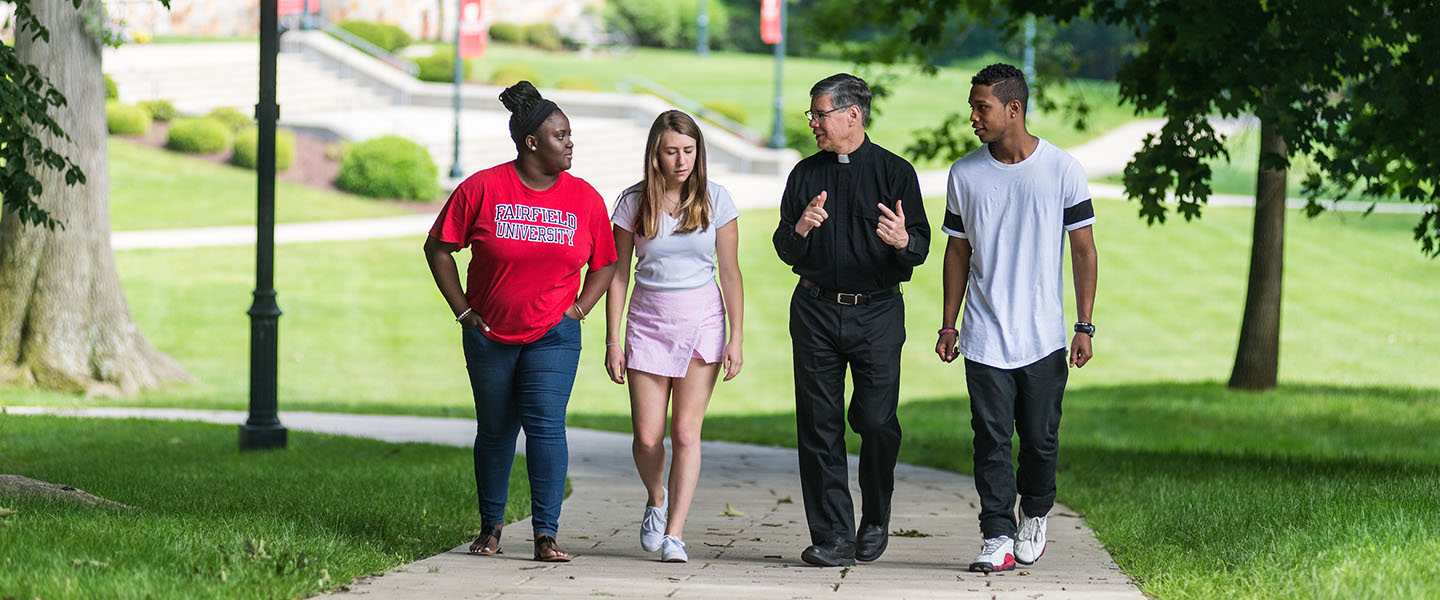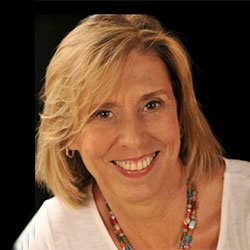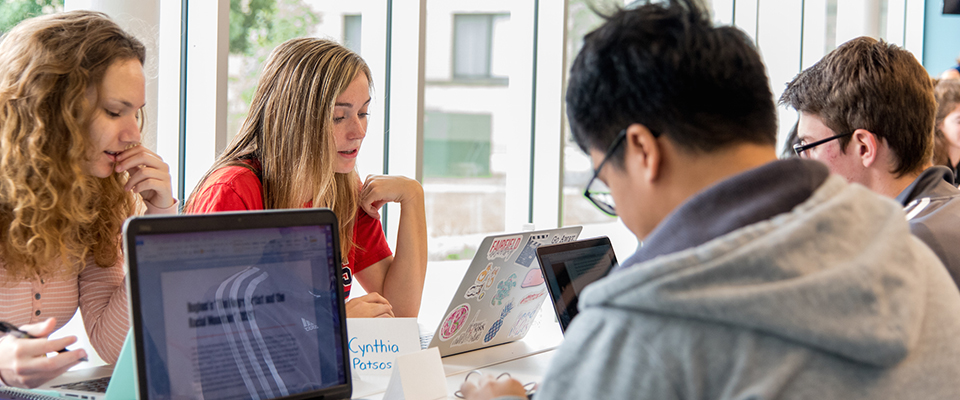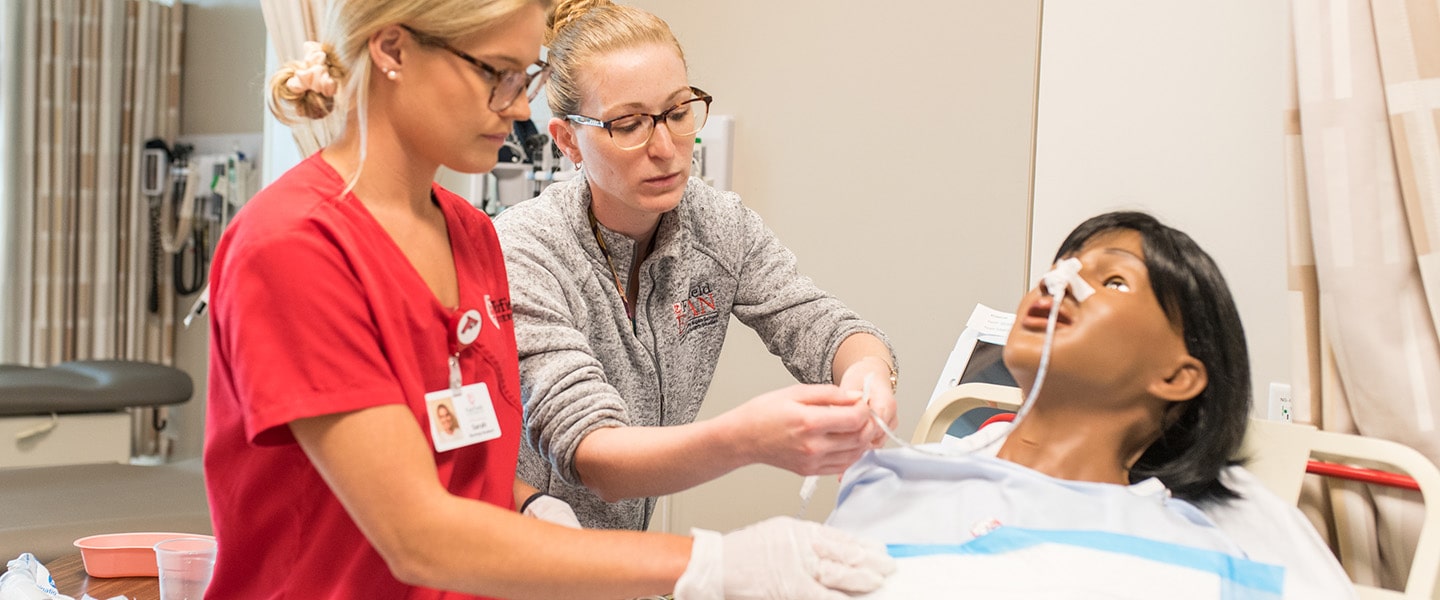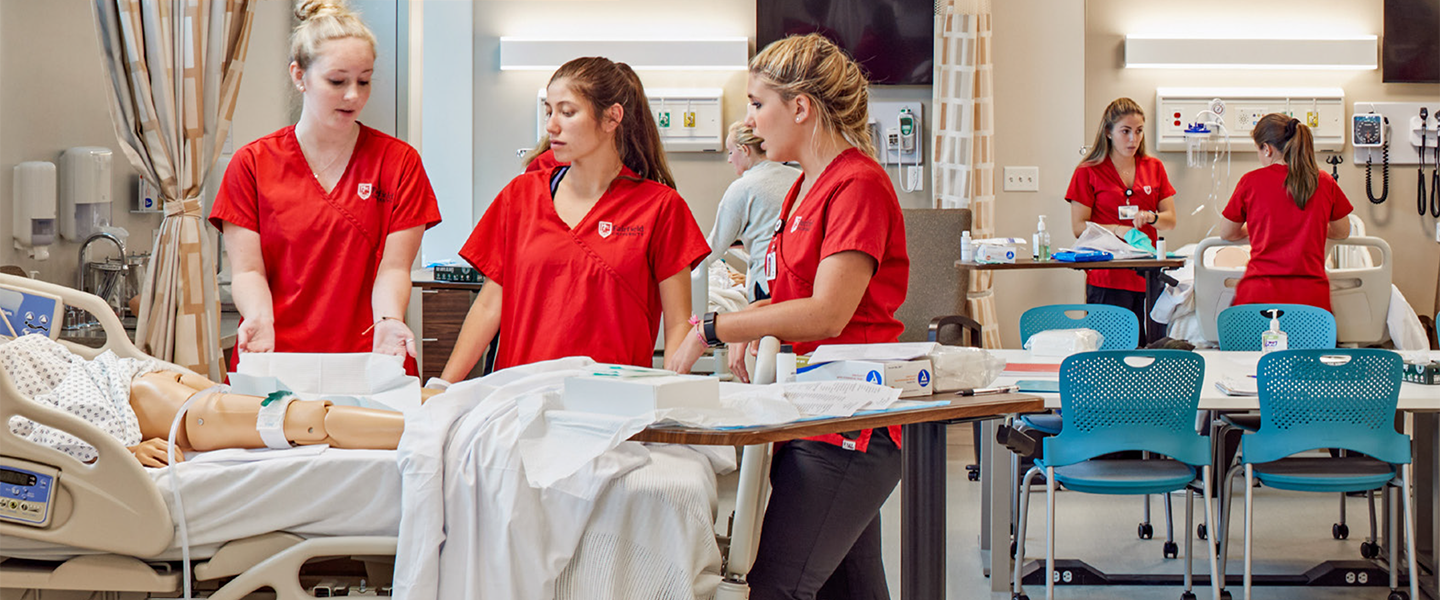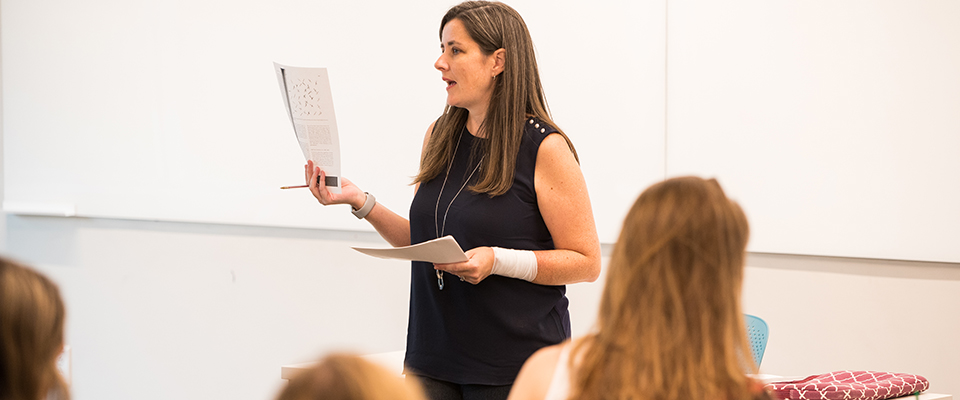On This Page
Program Overview
Social workers make a difference in the everyday lives of vulnerable individuals, families, and communities, practicing in settings such as schools, healthcare, elder care, court system, community organizations, corporations, employee assistance programs, child welfare, and government. There are more than 200 social workers serving in elected office, including governors, members of congress, and United States senators. Social workers provide nearly 60 percent of the mental health services in the nation, supporting people through challenges such as mental illness, addiction, grief, loss, and trauma. According to the U.S. Department of Labor Bureau of Labor Statistics, professional social work is one of the fastest growing careers in the country.
Mission
The Bachelor of Social Work program in the Egan School of Nursing and Health Studies at Fairfield University upholds and promotes racial, social, economic, and environmental justice to advance human rights and the elimination of oppressive systems and practices. The program aims to help students develop intellectual rigor, personal integrity, informed decision-making, self-reflection, and social responsibility within a framework of Jesuit and social work values. It seeks to promote the profession of social work by educating students to become "people for others" who are dedicated to service, respect the inherent worth and dignity of all persons, recognize social inequities and intervene as leaders for social change. The program educates students to engage in interdisciplinary collaboration with professional and community partners and will advance the social work profession through the service and scholarly contributions of its faculty.
Coursework
Coursework in the program reflects the interprofessional nature of the field and includes a solid liberal arts base, followed by coursework in human behavior, theory, social policy, research, and generalist practice including 450 hours of supervised field work. Our field education program has partnered with mental health agencies, supportive housing programs, community outreach centers, substance abuse services, group homes, and a hospital network.
Advising
The program operates within an atmosphere of respect and inclusion, ascribing to the Jesuit value of cura personalis, or “care of the whole person.” A dedicated faculty of practicing social workers provide students with focused advising, mentorship, and support, both individually and collectively.
Fifth Year Advance Standing Program
Students who successfully complete the program can apply to the master of social work program in Fairfield’s School of Education and Human Development.
Accreditation
The bachelor of social work and master of social work programs are fully accredited by the Council on Social Work Education.
Baccalaureate Social Work Program Assessment Outcomes
Council on Social Work Education - Form AS 4(B)
Fairfield University, Egan School of Nursing & Health Studies, Assessment of Student Learning Outcomes
Form AS 4(B) A form required for Reaffirmation, Candidacy, and ongoing compliance per AS 4.0.3
This form is used to assist the Commission on Accreditation in the evaluation of the program’s compliance with the accreditation standard below.
4.0.3: The program uses Form AS 4(B) and/or Form AS 4(M) to report its most recent assessment outcomes for each program option to constituents and the public on its website and routinely up-dates (minimally every 2 years) its findings.
All programs accredited by the Council on Social Work Education’s Commission on Accreditation (COA) are required to measure and report student learning outcomes. All students are assessed using a minimum of two measures on their mastery of the nine competencies that comprise the Educational Policy and Accreditation Standards (EPAS) and any additional competencies programs may choose to add. These holistic competencies reflect the dimensions (knowledge, values, skills, and cognitive & affective processes) of social work practice that all social workers are expected to master during their professional training.
Programs determine a percentage-based benchmark for each competency and determine an outcome-measure benchmark (minimum score) for each measure. The competency benchmark (which can differ for each competency) represents the minimum percent of students the program expects to have achieved the outcome measure benchmarks in both/all measures for each of the nine competencies. The program then determines the percentage of students that attained each outcome measure (e.g., minimum score or higher), and aggregates the percentages for both/all measures together to obtain the percentage of students demonstrating competence inclusive of two (2) or more measures. The result of aggregating both/all outcome measure percentages provides the percentage of students achieving the competency benchmark. An aggregated percentage at or above the competency benchmark is considered achievement of that competency. If the program has more than one program option, the program must report data for each program option, and also an aggregate of all program options combined to determine an overall percentage of students across all program options achieving the competency benchmark.
Per the requirement of CSWE COA’s recognizing body, the Council on Higher Education
Accreditation (CHEA), and accreditation standard 4.0.3, programs must post this form publicly
on its website and routinely up-date (minimally every 2 years) its findings. Upon request,
programs must provide CSWE with the weblink to the published form on the program’s website
where it is accessible to the public. Data presented on the form must be collected within 2 years
of today’s date at all times.
| Competency | Competency Benchmark | Percentage (%) of Students Achieving Benchmark | |
|---|---|---|---|
| Program Option #1 On Campus | Aggregate of All Program Options | ||
| Competency 1: Demonstrate Ethical and Professional Behavior | 80% | 1 | 100% |
| Competency 2: Engage Diversity and Difference in Practice | 80% | 1 | 100% |
| Competency 3: Advance Human Rights and Social, Economic, and Environmental Justice | 80% | 1 | 100% |
| Competency 4: Engage in Practice-informed Research and Research-informed Practice | 80% | 1 | 100% |
| Competency 5: Engage in Policy Practice | 80% | 1 | 100% |
| Competency 6: Engage with Individuals, Families, Groups, Organizations, and Communities | 80% | 1 | 100% |
| Competency 7: Assess Individuals, Families, Groups, Organizations, and Communities | 80% | 1 | 100% |
| Competency 8: Intervene with Individuals, Families, Groups, Organizations, and Communities | 80% | 1 | 100% |
| Competency 9: Evaluate Practice with Individuals, Families, Groups, Organizations, and Communities | 80% | 1 | 100% |
All students are assessed using a minimum of two measures on their mastery of the nine competencies that comprise the Educational Policy and Accreditation Standards of the Council on Social Work Education and any additional competencies programs may choose to add. Summarize the program’s competency-based assessment plan. Programs may add/delete rows to accurately reflect the number measures included in the data presented.
| Dimension(s) assessed: | Knowledge, Values, Skills, Cognitive and Affective Processes. |
| When/where students are assessed: | Spring 2024/SWRK 4308 |
| Who assessed student competence: | Prof. Joshua Neitlich |
| Outcome Measure Benchmark (minimum score indicative of achievement) for Competencies 1-9: | 3 out of 5 |
| Competency Benchmark (percent of students the program expects to have achieved the minimum scores, inclusive of all measures) for Competencies 1-9: |
80% |
| Percentage of Students Achieving Competency | 100% |
| Dimension(s) assessed: | Knowledge, Values, Skills, Cognitive and Affective Processes. |
| When/where students are assessed: | Spring 2024/SWRK 4510 |
| Who assessed student competence: | Field Instructor/Field Director |
| Outcome Measure Benchmark (minimum score indicative of achievement) for Competencies 1-9. | 3 out of 5 |
| Competency Benchmark (percent of students the program expects to have achieved the minimum scores, inclusive of all measures) for Competencies 1-9: | 80% |
| Percentage of Students Achieving Competency | 100% |
Requirements & Curriculum
Applications for the BSW program are evaluated by the Office of Admission. Students who declare a social work major are accepted directly into the Marion Peckham Egan School of Nursing and Health Studies bachelor of social work program in their first year.
To progress in the program, students are required to successfully complete all core, required courses and internship experiences. By accepting admission in the Egan School, the student understands the program eligibility and progression requirements. Social work students must follow all University educational policies and general regulations including those regarding academic progress.
Social work undergraduates will have close individual advising with social work faculty as well as ongoing group process with faculty beginning in their first year in the program.
In order to complete the BSW degree, students will earn 126 credits. Coursework in the major begins with two introductory courses in the first year, followed by a structured program, including 15 required courses, (45 credit hours) in social work. In addition, beginning in fall of the senior year, students will complete 450 hours (8 credits) over two semesters of supervised field education in a variety of social service agencies and community outreach settings.
In order to remain in the social work program, students must have:
- Cumulative overall GPA of 2.50 and 2.75 in the social work major by the start of junior year
- A minimum grade of C+ or higher in all social work courses.
- A passing grade in the Field Seminar and the Fieldwork Practicum
- The recommendation of the faculty advisor
Fairfield University students, who are currently undecided or enrolled in any major, have the option to change their major to social work. Interested students should contact the BSW program director, Dr. Kim Oliver at koliver@fairfield.edu.
Required Courses
| AETH 2285 Ethics of Health Care |
| HLST 2242 Immigration, Race, and Ethnicity in U.S. History |
| HLST 3201 Health Communication for Healthcare Professionals |
| NURS 1112 Healthcare Delivery Systems |
| PSYC 1010 General Psychology |
| PUBH 1101 Public Health and Social Justice |
| SWRK 1101 Social Work Essentials I |
| SWRK 1102 Social Work Essentials II |
| SWRK 2400 Social Work: An Introduction |
| SWRK 2410 History of Social Welfare |
| SWRK 3301 Human Behavior in the Social Environment I |
| SWRK 3302 Human Behavior in the Social Environment II |
| SWRK 3303 Social Policy and Social Justice |
| SWRK 3304 Research in Social Work Practice |
| SWRK 3311 Leadership for Interdisciplinary Health Professionals |
| SWRK 4305 Generalist Social Work Practice I |
| SWRK 4306 Generalist Social Work Practice II |
| SWRK 4307 Integrative Field Practicum Seminar I |
| SWRK 4308 Integrative Field Practicum Seminar II |
| SWRK 4951 Field Practicum I |
| SWRK 4952 Field Practicum II |
A detailed list of course requirements, offerings, and more can be viewed in the University’s course catalog.
Admission
With a long history of preparing men and women for careers in the expanding fields of medicine and health studies and ranked as one of the nation’s best nursing schools, The Marion Peckham Egan School of Nursing and Health Studies is dedicated to delivering an excellent, comprehensive education to our students.
More About Social Work
Life After Fairfield
Fairfield has a long history of success in preparing students with a solid foundation for the health professions. With the growing demand in the social work field, students can find a number of career opportunities in government agencies, and with contractors, think tanks, international agencies, humanitarian organizations and foundations as well as the corporate sector or in academia.
Learn about how Fairfield's Career Center can support your post-graduate goals, and how Fairfield's tight-knit alumni network can build career and mentoring opportunities that last a lifetime.
Diversity and Inclusive Excellence
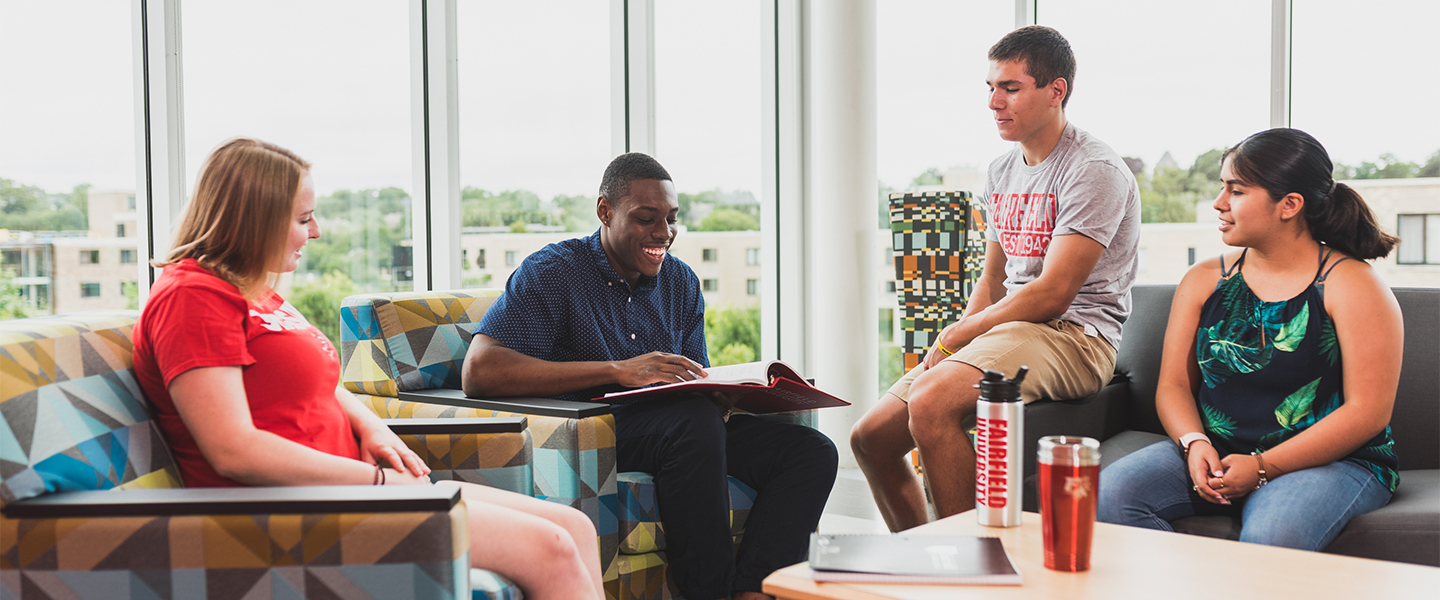
As a Jesuit, Catholic university, Fairfield is dedicated to diversity and inclusion; to radical hospitality in service of racial, social, and economic justice.
Egan Newsletter
Learn more about what our faculty, students, and alumni are doing, as well as stay up-to-date on our rankings and accolades, programs, and more.
Egan Update
We invite you to view the Egan Update, a year in review of Marion Peckham Egan School of Nursing & Health Studies news.
Faculty & Staff
Fairfield University’s Egan School boasts experienced faculty who inspire students to become leaders across social and healthcare environments. These students are actively engaged with faculty in practice, policy, scholarship, and service.
